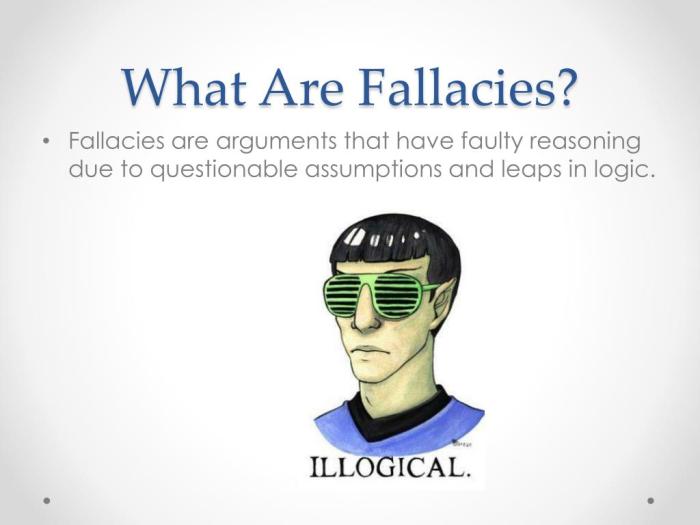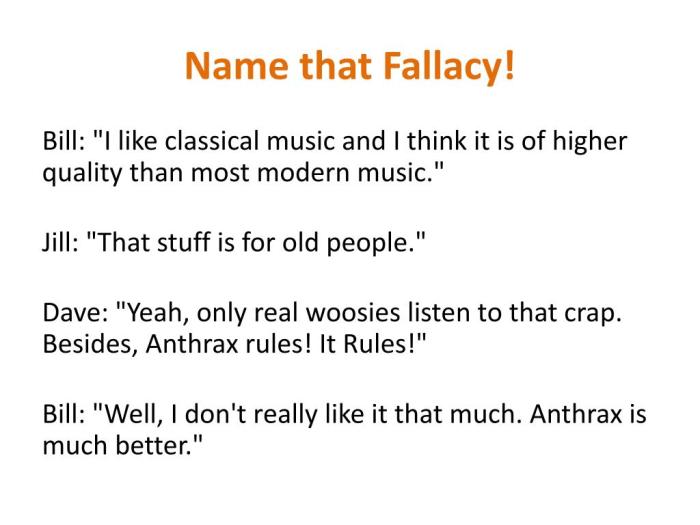Highly illogical name that fallacy – The “highly illogical name” fallacy is a common error in naming that occurs when a name is chosen without regard to its logical or meaningful connection to the object or concept it represents. This fallacy can have significant consequences, including impaired communication and reduced credibility.
In this article, we will explore the characteristics of illogical names, the potential consequences of using them, and provide alternatives for creating logical and meaningful names.
Defining the Fallacy

The “highly illogical name” fallacy refers to the use of names that are inherently illogical or nonsensical. These names often bear no relation to the object, concept, or person they are intended to represent, making them difficult to understand or remember.
Examples of highly illogical names include:
- A car named “The Purple Pickle”
- A software program called “Bob’s Brain Boost”
- A restaurant named “The House of Pancakes and More (But Not Too Much More)”
Characteristics of Illogical Names, Highly illogical name that fallacy
Illogical names often share several common characteristics:
- Unrelated to the subject:The name has no logical connection to the object, concept, or person it represents.
- Inconsistent with context:The name does not fit within the context in which it is used.
- Difficult to pronounce or remember:The name is long, complex, or contains unusual spelling or pronunciation.
- Unoriginal or uncreative:The name is a common or generic term that does not distinguish the object from others.
These characteristics contribute to the fallacy by making the name difficult to understand, remember, and relate to the subject it represents.
Consequences of Using Illogical Names
Using highly illogical names can have several negative consequences:
- Communication barriers:Illogical names can create confusion and hinder communication by making it difficult for people to understand or remember what is being referred to.
- Loss of credibility:Illogical names can damage the credibility of the person or organization using them by making them appear unprofessional or untrustworthy.
- Marketing failure:Illogical names can make it difficult to market products or services effectively because they fail to resonate with consumers or create a memorable impression.
Alternatives to Illogical Names
To avoid the fallacy of highly illogical names, consider the following suggestions:
- Use descriptive names:Choose names that clearly and accurately describe the object, concept, or person they represent.
- Use meaningful names:Select names that have a personal or cultural significance or that evoke positive emotions.
- Use concise names:Keep names short, simple, and easy to pronounce and remember.
- Use creative names:Think outside the box and come up with names that are unique, memorable, and reflect the spirit of the subject.
By following these guidelines, you can create logical and meaningful names that effectively represent your objects, concepts, or people.
Cultural Considerations
The perception of illogical names can vary across cultures.
In some cultures, illogical names may be seen as creative or humorous, while in others they may be considered disrespectful or confusing.
It is important to be aware of the cultural context when choosing names to avoid potential misunderstandings or offense.
General Inquiries: Highly Illogical Name That Fallacy
What are the common characteristics of illogical names?
Illogical names are often arbitrary, meaningless, or unrelated to the object or concept they represent.
What are the potential consequences of using illogical names?
Illogical names can impair communication, reduce credibility, and create confusion.
What are some alternatives to illogical names?
Logical names are clear, meaningful, and relevant to the object or concept they represent.

